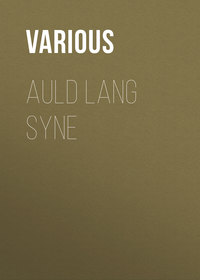
Ainslee's, Vol. 15, No. 5, June 1905
“If you had intended so far to honor us,” the old lady replied, icily, “I should have thought that you would have approached the subject with some degree of formality.”
“Miss Herron!”
“To speak of such matters in an – automobile is to treat them very unbecomingly. It is not,” she continued, and all her unbending rigidity of demeanor was behind her words, “dignified.”
“Being dignified,” cried Archie, hotly, “hasn’t anything to do with being in love.” Was it a smile that lighted up her craggy features, like sunshine on granite. “You don’t understand.”
“Apparently not. I am quite unused to the ways of modern youth. The world’s moved very fast in recent years. In an – automobile – as it were.”
“But Lucy – ”
“Well, Mr. Fraser?”
“I – ”
“Let us not refer to her, I beg.”
“Not ever again?” he asked, but with no hint of disappointment.
“I am surprised that you so much as dreamed of it under the present circumstances,” she replied, tartly.
Archie laughed shortly. “Please forget that I so far forgot myself,” he begged. “It was wrong, under the present circumstances.” All the boy’s sunny malice shone from his clear eyes. “I ought to have remembered my real duty and pleasure.”
“And that,” Miss Herron asked, for once caught unawares, as it appeared, “is what?”
“Watch!” said Archie, briefly.
They had come by now to the beginning of the solid macadam road that runs across the county, to the joy of the chauffeur as to the corresponding dismay of the truck farmers for whom it was constructed. There was nothing ahead to break the long, hard track. Archie reached down beside him, though his eyes never left his course or one hand the steering wheel, and set his hand to some lever. The song of the great machine was for a second broken; then a new song of the road began, louder and fiercer than the first and in quicker measure. Miss Herron felt as she did the first time she descended in the express elevator of a high office building. She was conscious that her hat was tugging at its pins. She settled herself back deeper in the seat and braced her feet stiffly, only to bounce up as they ran over some stick.
“Oh!” she gasped. “Ahem!”
“Sit tight,” counseled Archie, suavely. “We’ll get there in time, all right, if nothing happens.”
“If anything breaks,” she remarked, “you can usually get somebody to tow the machine home.”
“People are very charitable. Yes, Miss Herron.”
“Up to a point.”
And to that Archie had no rejoinder. It was perhaps as well that he did not see the smile that his passenger wore. It might have taken the edge off his revenge.
The houses commenced to appear at more frequent intervals now, and took on a character a little different from the old weather-grayed dwellings of the open country. There showed a white, slim church spire above the trees.
“Scarborough,” said Archie, and made the horn speak.
“You’ll be careful?” she asked. “Through the village – ”
“Honk! honk!” This for a couple of children, who, starting to run across the road, doubled back like rabbits. Miss Herron caught just a glimpse of their white faces, and the end of their father’s torrent of imprecation. Now it was the horse of a baker’s wagon that climbed the bank by the roadside in two leaps and pranced shiveringly. Some boys cheered and then flung stones.
“Dear me!” ejaculated Miss Herron. “I rather hope we’ll meet nobody I know.”
“The sheriff himself couldn’t stop us now.”
“But – ”
“Honk! honk!”
“Oh, Mr. Fraser!” They missed by a foot a carriage that was beginning slowly to turn around, and was nearly straight across the road when Archie twitched the automobile aside as if it was a polo pony.
“The stupid creatures!” cried Miss Herron, indignantly, when her heart commenced to beat again, “to block the way!”
“That was a close shave,” commented Archie.
“Not too recklessly, Mr. Fraser.”
“I must get you to the meeting, ma’am.”
“But the risk – ”
“If I can’t have Lucy,” the boy declared, sullenly, “I don’t care what happens.”
“Assure me,” demanded his passenger, after a brief moment, during which with no slackening of speed the great machine tore down Scarborough’s main street like a green tornado, “that you retain entire control of the thing.”
“Oh, yes.”
Another pause. “I suggested that you make no mention of Miss Lucy.”
“I can’t have her?”
“How fast can the automobile go?” asked Miss Herron, ignoring the boy’s question.
“Some faster than this. But Lucy can – ”
“Let us not discuss the matter, please.”
“I can’t have her?”
“I beg, Mr. Fraser, I beg you to center your attention on driving your machine.”
“Well, I will, then. I’ll drive her,” said the boy, grimly, “good and fast.” They came again to the open, but the road continued hard and broad, with only long curves around the base of a hill now and then. The wind blew the old lady’s hair into disarray, her dress was gray with dust, her eyes smarted terribly; she gave from time to time a little gasp – or was it a laugh? – and clutched at Archie’s arm, which held so rigid and strong to the tiller wheel. “This’ll be her finish, all right,” he thought. “Cross old cat. Scared?” he asked of her.
“I beg pardon?”
“You’re not scared, I suppose?” he said, mockingly.
“I have been accustomed to fast driving, Mr. Fraser, all my life.”
It was because she made that reply that Archie, quite desperate by now, dared what finally did occur. And this was occasioned by his spying in the distance another big car headed as he was, but moving less rapidly. In a minute he was alongside, and jammed on the brakes. The other driver, who was heavily mustached, red-faced and had three airy young damsels stowed in the tonneau, looked up in surprise.
“Hello, Isidore!”
“Hello! Hello, Mr. Fraser!”
“I’ll race you to the bridge.”
“Go on, now! Watcher think I got here?” But the girls chorused delightedly, and teased their driver – all but one, and she leaned forward to whisper confidingly, with her arms around his fat neck. Miss Herron surveyed the landscape.
“’Fraid cat!” giggled the girl. “You’re afraid, Mr. Mayer.”
“I ain’t, only – ”
“One!” cried Archie, releasing his steed again. “Two!”
“Leggo, May!” grunted the other.
“And – ”
“Three!” yelled Mayer. “To the bridge!”
By mere good luck the highway was empty, for to think that any cart or carriage could be passed was absurd. Side by side the huge machines, scarlet, green, alive with shining brass, tore along with the roar of express trains between the ditch and the bank. The slightest swerve at such speed meant death. The chatter of the careless girls dwindled, the faces of the rival drivers grew pale and tense.
“Oh, be careful!” murmured Miss Herron. “It’s very dangerous.”
“Very,” replied Archie. “Promise me Lucy and I’ll slow up.”
A sudden little shriek of joy and some handclapping from Mayer’s tonneau interrupted what the old lady might have answered. Glancing over, Miss Herron perceived that their rival had drawn ahead a yard or more, that the girls were crying taunts at her. Not far away now there showed a gleam of the river. And then Archie encountered the greatest surprise of his life.
“Saucy things!” remarked his passenger, and fell silent again.
“Come on!” called the prettiest of the three, through her hollowed hands. “Old freight car!”
“Archie!”
“Yes, Miss Herron?”
“Can’t you – Oh!”
“What, ma’am?” From the tail of his eye he was aware that Miss Agatha was wringing her hands.
“Archie, they mustn’t beat us!”
“I guess I’ll crowd him.”
“Oh!”
The time was ripe, he thought. “Give me Lucy,” he repeated, doggedly, “or I’ll foul him.”
He had expected to frighten her. He had told himself what fun it would be to hear her give her agitated assent, with the fear of death on her if she refused. It was to be a fine revenge. But Miss Herron only raised a warning forefinger.
“Archie Fraser,” she said, in trembling tones, “if – if you take the dust from those common young women and that vulgar man, I’ll never forgive you.”
“Great heavens, Miss Herron! I – I – ”
“Beat ’em!” she ordered truculently.
He stuck blindly to his point: “Lucy?”
“Beat ’em! Show me,” she declaimed, in trumpet tones, “that the man who wants to marry a Herron has some courage in him. Now!”
The road narrowed just ahead, where it led through a cut in the hill and then down to the bridge. On either side the banks rose eight or ten feet, and very steep, and beyond was a sharp curve. Archie made his horn speak angrily, as once more he came abreast of his rival, favored by the fact that Mayer had struck a strip of newly repaired and soft roadway some yards long. A second later he was leading.
“Pull up!” he bellowed hoarsely, crouching forward over his tiller still lower. He dropped his hand to the emergency brake. The cut was not six rods off. Once more the girls cried out, but this time in shrill fear. Miss Herron remained calm as the Sphinx.
“Honk!” from Mayer, and the click of levers. His machine slid along in a cloud of dust. “You win!”
It was ten minutes before the victors exchanged a single word. They rattled over the long bridge, steered up the streets of Oldport to the place where the Daughters were in session. Then Archie lay back with a sigh.
“You weren’t scared a bit!” he exclaimed, frankly doleful.
The old lady straightened her hat, lightly brushed off the top layer of dust from the front of her dress, then gave the briefest of queer little laughs. “It is one of the traits of my family,” she said, “never to be surprised at anything. And another,” she added, descending majestically from the automobile, “is to make the best of circumstances which appear to be inevitable.”
The boy blinked. “I don’t understand,” he stammered.
Miss Herron touched him on the arm. “I trust, then, that Lucy will express herself to you more clearly. In case – if you should venture to ask her a question.”
And with that the old lady minced her way up the steps of the house to disappear within doors.
“Good Lord!” exclaimed Archie, as the light began to break.
TWO SORROWS
Before Love came my eyes were dim with tears,Because I had not known her gentle face;Softly I said: “But when across the yearsHer smile illumes the darkness of my place,All grief from my poor heart she will efface.”Now Love is mine – she walks with me for ayeDown paths of primrose and blue violet;But on my heart at every close of dayA grief more keen than my old grief is set, —I weep for those who have not found Love yet!Charles Hanson Towne.LOVE AND MUSHROOMS
By Frances WilsonVan Mater, out on the coast for the melancholy purpose of witnessing what he conceived to be Corny Graham’s crowning indiscretion – that is to say, his marriage – found himself lingering for the purpose of basking in California’s smiles. The writing instinct, which in the little old town on Manhattan would keep his hand traveling back and forth across the paper for days at a stretch, here languished and drowsed like some heavy-eyed, faintly smiling lotus eater.
He had, to be sure – in a spurt of energy that subsided almost as quickly as it came – begun a song to that sybaritic state, in which it was represented as a lady around whose neck hung
A chain ablaze with diamond days
All on the seasons strung,
which he thought sounded rather well.
Then, unfortunately, the rains set in and the result was a mental washout that carried the last vestige of his poetical idea out into the vasty deep where individual ideas become world-thought, though there was a moment when he had an inspiration – something about keeping Lent, which should typify the rains. But this, too, drifted off like a chip on an ocean, and the song became mere literary junk.
Probably the law of compensation is responsible for the fact that, while the coast’s dazzling summer is flawed by trade winds, its rainy season is tempered by mushrooms. At least, so thought Van Mater. Connoisseur that he was in the joys of living, he confessed to a new sensation when, for the first time, he found himself plodding over the seared, round-shouldered hills, spongy with the supererogatory wetness of a three days’ downpour. The rain had ceased temporarily, but the sky wore a look of ineffable gloom, and the feathery mist trailed along the earth like an uneasy ghost.
Some swarthy, dark-eyed Portuguese children, met on the road the day before, had proffered him their pail of spoil, and as he examined its contents he understood, for the first time, what a mushroom really ought to be. Their dank odor – the odor of germinating things – seemed to come from down in the earth where the gnomes are supposed to foregather; and Van Mater’s thoughts reverted with withering scorn to certain woodeny, tan objects that had been foisted upon him from time to time as mushrooms – always, he now triumphantly recalled, to his own inward amazement.
Why, when and where mushrooms had won their vogue with epicures, he had often dumbly wondered, though he had remained silent lest he expose a too abysmal ignorance. Now he chuckled hilariously. It was his acceptance of those frauds – those mere shells from which the souls had fled – that displayed ignorance! In future he would know better, and he tossed the children a quarter and went his way, in a pleasant anticipation of the manner in which he would carelessly throw off to certain admiring friends:
“But I never eat mushrooms, save they come straight to the table from the soil, picked within an hour of the time when the rain ceases. Those things? Why, my dear fellow, you might as well eat so much gristle. Talk about the bouquet of wine! Why, the bouquet of the mushroom is as delicate and elusive as – as – ” The simile failed to materialize, but he went on eloquently: “You can no more preserve it than you can the dew upon a plum.” All of which sounded so well that he speculated anxiously upon the probability of any of the said fellows divining how very little he knew about the matter, after all. They were so deuced knowing, some of them; but it seemed a pity to let an idea like that, what had actually leaped from his brain full-fledged, go to waste. Decidedly, it was worth the risk.
His mind again reverted to the subject with pleasant anticipation when, the next afternoon, clad in knickers and a Norfolk, with a cap pulled rakishly over his eyes, he trudged over the hills to which the children had directed him. Soon, however, everything was blotted from his consciousness save a section of brown hill, over which his eyes roved eagerly in search of the small, Japanese-looking fungi.
“Mushroom or toadstool?” was his stern inward query, as the pert little parasols became more and more numerous; and he did not realize that he had spoken aloud until a gush of laughter caused him to raise his eyes hastily.
She was not three steps away, and from the trim leather leggings, above which her kilted skirt swirled, to the thick sweater and Tam that she wore, she seemed to Van Mater the most dashingly correct damsel he had ever seen. The foggy air had brought a delicious color to her cheeks and brightness to her eye which made her seem a very creature of the out-of-doors, and Van Mater stared, charmed and arrested.
“Evidently you don’t recognize me,” she suggested. “I was the third bridesmaid – the one in pink – the homely one, you know.”
She eyed him with a wicked satisfaction while the color rose to his face. He had a disagreeable recollection, since she identified herself so minutely, that he had rather passed that particular bridesmaid over with scant attention, amazing as it now seemed. Then he recovered himself, and with that gallant movement of the arm which seems the perfect expression of deference, removed his soft cap and bowed low, as he said:
“Of course – I remember you perfectly now, Miss – ah.”
He tried, as he took her extended hand, to mumble something unintelligible enough to pass for her name, looking at her with an admiration purposely open in the hope of distracting her attention, but the ruse was of no avail. She only smiled into his face with impish delight.
“You people from the East are so dreadfully disingenuous,” she complained. “Why not confess frankly that, so far as you are concerned, I belong to the ‘no name’ series?”
Her eyes were dancing, and suddenly Van Mater felt as if he had known her always – eons before he had known himself in his present incarnation.
“To think that I shouldn’t have recognized you in the pink gown,” he murmured, with well-feigned surprise. “And to think that I’m no more surprised than I am to have you suddenly bob up here in the wet, after your wanderings of perhaps a hundred lifetimes! I can’t seem to recall the date and planet upon which we last met,” he continued, apologetically, “but I fancy that we picked mushrooms in those old times – that the earth and air were all sopping, just as they are now.”
“You write books – you know you do!”
“Well – it’s a decent enough occupation!”
“Yes,” uncertainly. “Still, writers aren’t usually very sincere; they don’t mean what they say. They spin copy as a spider does a web!”
“Writers not sincere – don’t mean what they say!” he echoed. “Why, my dear young lady, you’re all wrong. They usually mean so much that they can’t begin to say it – and as for sincerity, they’re the sincerest people in the world!”
“That is, while it lasts!” he added to himself, but his listener, who had stooped to the ground and was now holding up a particularly large and luscious mushroom, was all unconscious of his reservation.
“Look out! You’re stepping on them!” she cried, excitedly, and for the next ten minutes they wandered about with eyes bent on the earth in fascinated absorption. Van Mater at last straightened up with such a thrill of satisfaction as he had not experienced since boyhood.
“My pail’s full,” he called, seating himself on one of the projecting bowlders. “So come and show me where to pick the beefsteaks.”
She pointed upward. Where the hill humped itself against the sky the blurred figure of a cow was visible. Van Mater tried again.
“You might come and rest,” he coaxed, pointing to another bowlder that cropped out in friendly nearness to his own. With a last lingering scrutiny of the ground about, she came, seating herself beside him. Then, with her chin resting on her hands, she surveyed him with a sort of boyish sang-froid.
“We’re right cozy for acquaintances of a half hour’s standing,” she remarked, at last. “But, then, I’ve heard about you for so long. You see, Corny told Beth, and she has – well – mentioned you to me.”
“Pooh – that’s nothing! I tell you, I’ve known you for centuries. I remember that when I heard of one of those theosophist fellows marrying a girl he’d known for a thousand years or so, I roared. Now I understand it!” (Very solemnly.)
She did not speak, and he began again with increased seriousness:
“Really, I’m in earnest, you know. I’ve the most curious sense of – well, of companionship with you – as if we’d known each other indefinitely, as if – ”
She interrupted rather hastily.
“Honestly?”
Tersely – “Upon my soul.”
She rose somewhat hurriedly. “It’s going to rain!”
“Never mind. I have a conundrum. Why is love like a mushroom?”
She wrinkled her brow. “Because it’s easily crushed, I suppose, and you’re never quite sure of it.”
“Wrong. Because it springs up in a night – that is, in an hour,” he answered, impressively.
The drops began to fall softly, swiftly, easily, as if they would never more be stanched.
“Come,” she said, but her cheeks were more richly colored than before.
“Isn’t this heavenly?” he murmured, as they vanished down the road in a blur of rain. She did not answer, but her eyes were shining.
SOME FEMININE STARS
By Alan DaleAdvertised personalities. Enormous sums squandered on theatrical impossibilities. Amelia Bingham’s pluck and restlessness. “Nancy Stair” rather tiresome. Lesser lights in star-dom.
Three thin, anæmic, bedraggled plays, each with a heralded, exultant feminine “star” skewered to its bloodless pulp, dropped into this metropolis just ahead of the reluctant crocus. Three highly advertised “personalities” tried to weather out a veritable emaciation of drama, and the result was, of course, a foregone conclusion. Slowly but surely is knowledge being forced upon the deluded manager, and he is learning to appreciate the vital truth of the much battered Shakespearian quotation, “The play’s the thing.” No trumped-up interest in one particular puppet will take the place of the drama itself. This is a pity. It is easier to create a marionette than it is to construct a play.
The three highly advertised “personalities” that reached us at crocus time were owned and engineered by Miss Amelia Bingham, Miss Mary Mannering and Miss Virginia Harned. I mention them in the order in which they appeared, which is not necessarily that of superior merit. They came in at the fag end of a tired season, dragging a load of pitiful dramatic bones. Hope ran high, but fell in sheer despondency. In spite of the fact that the poet prefers to picture hope as springing, I think that in this case it may be better portrayed as running. There is a sensation of panic in the race.
Miss Bingham came to town with a very swollen “comedy-drama,” called “Mademoiselle Marni,” from the pen of a “monsoor,” programmed as Henri Dumay – said to be an American “monsoor” at that. This actress affects French plays for reasons that have never been explained, and that certainly do not appear. As a “star,” she is of course entitled to treat herself to any luxury that may seem to tempt her histrionic appetite, and the Gallic siren evidently appeals to her. It is not likely that there will be international complications, although the provocation must at times be keen.
“Mademoiselle Marni” was one of those impossible chromos that might have been designed for the mere purpose of giving one’s sense of humor a chance to ventilate itself. In the serious theater-goer – and one is bound to consider him – it awoke amazement. How is it that at rehearsal a dozen presumably sane people can “pass” such an effort, he must have asked himself? Why is it that in a theatrical venture that costs a great deal of money, there are no misgivings? The serious theater-goer is never able to answer these questions.
It is almost proverbial that the most hopeless sort of theatrical enterprise – if conventional – never languishes for lack of funds. Try and start a solid business scheme, in which you can calculate results in black and white, and the difficulties and discouragements will be almost insuperable. Endeavor to obtain money for an invention or innovation that has success written across it in luminous letters, and you will “strike a snag,” as the rude phrase goes, with marvelous celerity. But a bad play – one that to the unsophisticated theater-usher or to the manager’s scrubwoman must perforce appear as such – experiences no such fate. This is one of the marvels of theaterdom.
In the case of “Mademoiselle Marni” Miss Bingham herself must have spent an enormous sum that she would probably have hesitated to invest in some enterprise sane or possible. The play was a turgid coagulation of illogical episodes lacking in all plausibility. This particular actress is generally happy when she can select for herself a character that is beloved by all the masculine members of the cast. Apparently, she “sees” herself in this rôle. She likes to appear as the personification of all the virtues, self-sacrificing and otherwise, and this idiosyncrasy is, of course, frequently fatal to sustained interest. We do not care for these sensational paragons.
In “Mademoiselle Marni” Miss Bingham played the part of a very beautiful French actress, of whom everybody said: “Oh, what a woman!” (Perhaps the audience also echoed that phrase, but with quite a different significance.) She was exquisitely in love with Comte Raoul de Saverne, who was engaged to another, and was “ordered” away from her by the father of that other. This parent was a very wicked baron, and just as Mlle. Marni in an ecstasy of rage was about to strike him, somebody called out: “Do not hit him; he is your father.”









